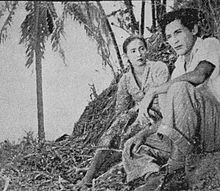Embun
| Embun | |
|---|---|

Leman and Ira in a scene from the film
|
|
| Directed by | D. Djajakusuma |
| Produced by | Surjo Sumanto |
| Starring |
|
| Music by | GRW Sinsu |
| Cinematography | Max Tera |
| Edited by | Soemardjono |
|
Production
company |
|
|
Release date
|
|
|
Running time
|
120 minutes |
| Country | Indonesia |
| Language | Indonesian |
Embun (Indonesian for Dewdrop) is a 1952 film directed by D. Djajakusuma for Perfini in his directorial debut.
After the conclusion of the Indonesian National Revolution, Leman (AN Alcaff) and Barjo (Rd Ismail) go to the national capital in Jakarta and live off government donations. When a meeting goes awry, Leman accidentally kills the prospective donor, and Barjo and Leman escape. They go their separate ways, and Leman remains on the run for five years. He ultimately settles in a village.
As he had been given everything he needed while a guerrilla, Leman is shocked when society appears to ignore him. He tries to earn a living as a farmer, but is unable to do so owing to the ongoing drought. He decides to go to the city and find work. However, this plan is stopped when his girlfriend Ira (Titi Savitri) convinces him that it is his duty to stay in the village and help it develop.
One day, Leman learns that Barjo has become rich off prostitution and gambling rackets. When Leman confronts his former friend, the latter forces him to work as a driver. When Leman learns that they are smuggling weapons, he faces off against Barjo and the two fight on a mountaintop; this ends with Barjo's death.
Embun was co-written and directed by D. Djajakusuma for Perfini while its head and regular director, Usmar Ismail, went abroad to study cinematography. Although Djajakusuma had worked for the company since assisting with the production of Enam Djam di Jogja in 1951, this film was both his first as a director and his first as a screenwriter, though writing duties were also shared by Basuki Resobowo and Gajus Siagian. With the release of Embun, Djajakusuma became one of four directors to work for Perfini, and as with Ismail he was known as a realist.
This black-and-white film was produced by Surjo Sumanto, with cinematography by Max Tera. Soemardjono handled artistic direction and editing, while music was handled by GRW Sinsu and sound managed by Sjawaludin and Bob Saltzman.
...
Wikipedia
